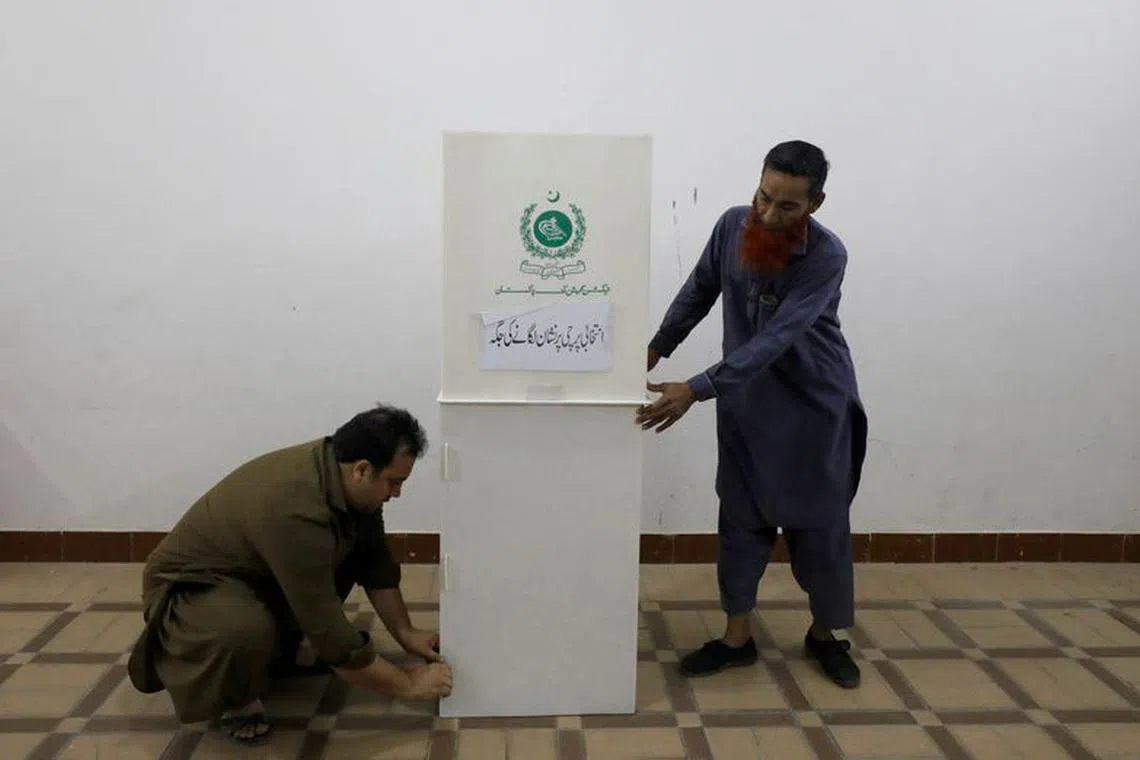Pakistan counts votes in an election hit by violence and suspension of mobile services
Sign up now: Get insights on Asia's fast-moving developments

Unofficial first results in Pakistan's election are expected a few hours after voting closes at 5pm local time (8pm Singapore time) and a clear picture is likely to emerge early on Feb 9.
PHOTO: REUTERS
ISLAMABAD - Pakistan began counting votes after polling ended on Feb 8 in a general election marred by militant attacks and suspension of mobile phone services, with the authorities saying that at least nine people were killed across the country.
The vote was held as the South Asian country struggles to recover from an economic crisis while it grapples with rising militant violence in a deeply polarised political environment.
TV channels are expected to make projections of first results a few hours after the close of voting at 5pm (8pm Singapore time), and a clear picture is likely to emerge early on Feb 9 as counting continues through the night.
Many analysts believe the vote may not produce a clear winner.
Thousands of troops were deployed on the streets and at polling stations across the country, and borders with Iran and Afghanistan were temporarily closed as security was stepped up to ensure peaceful polling.
Despite the heightened security, nine people, including two children, were killed in bomb blasts, grenade attacks and firing incidents.
The Interior Ministry said it took the security steps after at least 26 people were killed in two explosions near electoral candidates’ offices in the south-western province of Balochistan on Feb 7. The Islamic State of Iraq and Syria later claimed responsibility for those attacks.
The victims on Feb 8 included five policemen killed in a bomb blast and firing on a patrol in the Kulachi area of Dera Ismail Khan district in the north-west, the authorities said.
The two children died in a blast outside a women’s polling station in Balochistan.
Mr Mohsin Dawar, chairman of the National Democratic Movement party and candidate from North Waziristan – a hotbed for Islamist insurgents in north-west Pakistan – said in a letter to the Election Commission of Pakistan (ECP) that some polling stations in his constituency were taken over by local “Taliban” who were threatening polling staff and locals.
There was no immediate confirmation from the election commission or security forces.
In spite of the security worries and bitter winter cold, long queues began forming at polling stations hours before voting was due to start.
“The country is at stake, why should I come late?” said 86-year-old Mumtaz, a housewife a decade older than Pakistan itself, as she queued in Islamabad.
The move to suspend mobile networks sparked criticism from leaders of opposition parties, with Pakistan People’s Party’s Mr Bilawal Bhutto Zardari, the 35-year-old son of former premier Benazir Bhutto, calling for its immediate restoration.
Amnesty International called it “a blunt attack on the rights to freedom of expression and peaceful assembly”.
Chief Election Commissioner Sikandar Sultan Raja said the decision on mobile networks was made by “law and order agencies” following violence on Feb 7, and that the commission would not interfere in the matter.
Jailed former prime minister Imran Khan’s
ECP officials said they received several complaints from people who could not find their polling stations because of the Internet shutdown.
“The communication with voters and others is very difficult... We are facing so many problems due to the Internet closure,” said 50-year-old schoolteacher Mehmood Chaudry, who cast his vote in the city of Rawalpindi.
Sharif the front runner
Former prime minister Nawaz Sharif, considered by many analysts to be the frontrunner, dismissed talk of an unclear result, and emphasised the need for a clear majority.
“Don’t talk about a coalition government. It is very important for a government to get a clear majority... it should not be relying on others,” Mr Sharif, a three-time prime minister, told reporters after casting his vote in the eastern city of Lahore.
The main contests are expected to be between candidates backed by Khan, whose party won the last national election, and Mr Sharif’s Pakistan Muslim League-Nawaz.
The military has dominated the nuclear-armed country either directly or indirectly in its 76 years of independence, but for several years, it has maintained it does not interfere in politics.
“The deciding factor is which side the powerful military and its security agencies are on,” said Mr Abbas Nasir, a columnist. “Only a huge turnout in favour of (Khan’s) PTI can change its fortunes.”
He added: “Economic challenges are so serious, grave, and the solutions so very painful that I am unsure how anyone who comes to power will steady the ship.”
If the election does not result in a clear majority for anyone, as analysts are predicting, tackling multiple challenges will be tricky – foremost being to seek a new bailout programme from the International Monetary Fund after the current one expires in March. REUTERS


